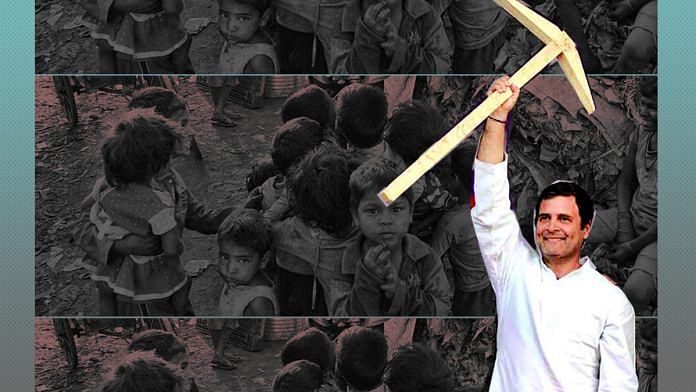Congress President Rahul Gandhi announced Tuesday that he would ensure minimum income guarantee for the poor across India if his party is voted to power in the 2019 Lok Sabha elections. Gandhi’s promise comes at a time when the Modi government is reportedly considering cash transfers.
ThePrint asks: Is Rahul Gandhi’s pledge a smart political pre-empt of Modi govt or is it a season of bad economic ideas?
Rahul Gandhi enjoys being Santa Claus rather than help the poor stand on their feet
 Narendra Taneja
Narendra Taneja
National spokesperson, BJP
Rahul Gandhi’s promise is nothing but pre-poll sloganeering. It is yet another promise that hasn’t been seriously thought through by the Congress party. In 1971, their slogan of choice was “Gareebi Hatao” – but they did nothing for the poor.
Rahul Gandhi knows his party is not coming to power in 2019. Other leaders don’t want anything to do with the congress – be it Mayawati’s BSP or Akhilesh Yadav’s SP in Uttar Pradesh, or Mamata Banerjee in West Bengal. The Congress stands completely isolated. Hence, a sulking Congress is taking shelter under populism and sloganeering.
This is why Rahul Gandhi is making arbitrary promises at the drop of a hat. Tomorrow, he may even promise a free Mercedes to the citizens of the country, because he doesn’t need to worry about delivering on those promises.
Nothing about his scheme is novel. The idea has been discussed in Europe for years. The reason why Rahul Gandhi rushed to announce it is because the Congress party is aware that the BJP has already implemented several strong pro-poor schemes and several others are in the pipeline.
The BJP is a party for the poor. He knew we might just announce more pro-poor plans in the budget, so he wanted to pre-empt it.
Our budget will focus on two things: reducing extreme poverty and boosting economic growth. Unlike Rahul Gandhi, we believe in empowering the poor. He was born a princeling, so he believes in treating the poor in a patronising manner. He enjoys being the Santa Claus, rather than helping the poor stand on their own feet. The BJP is a party of the poor and therefore we think in terms of empowering them and boosting their self-esteem and dignity.
For the BJP, it is Mission 2019, for Congress, it is Vision 2019
 Vinayak Dalmia
Vinayak Dalmia
Spokesperson, Congress
Minimum income guarantee means maximum prosperity. The time has come for a surgical strike on poverty.
Congress president Rahul Gandhi is batting on the front foot, with courage and gumption.
He has laid out his vision for a new India. In the words of Mahatma Gandhi, an India that shall entail ‘swaraj for the hungry and starving millions’.
India saw a 50 per cent reduction in absolute poverty during the UPA years (Oxford 2018 Report). During the same period, 140 million people were lifted out of poverty.
For those questioning the idea, similar concerns were raised when MGNREGA was introduced in 2005. When there is a political will there is always a way. The Congress will balance this while being fiscally responsible – as we have done in the past. Good economics and responsible politics can go hand in hand.
An income guarantee will address:
Social justice
Poverty reduction
Improved agency for the poor
Insurance against shocks
While today is not the day to squabble, I do wish to ask a question to Modi government: If you say this is a populist measure, will you not also copy it in your Budget?
For the BJP it is Mission 2019, for us, it is Vision 2019.
The poor have the first claim on India’s resources. And that is non-negotiable and beyond debate.
Also read: Poverty or inequality: What is more important for India and Indian economists
A better option is to monetise surplus public asset and address poverty
 Rajesh Jain
Rajesh Jain
Political and tech entrepreneur
If a nation has just two inhabitants – Ajay and Vijay; and Ajay’s income is Rs 1.5 lakh, Vijay’s is Rs 50,000. If, under Minimum Income Guarantee (a new variation of the tax-and-spend schemes), the base income level is set at Rs 1 lakh. Thus, Rs 50,000 from Ajay will be transferred to Vijay. Both will now be at the Rs 1 lakh level.
No new wealth is created – it is simply redistributed. Over time, Ajay will either leave India or decide it is better to be Vijay – pushing the country on a downward slope of declining productivity and income.
A better way is to monetise Rs 1 lakh of idle government assets. From this, Rs 50,000 is returned to both Ajay and Vijay since both have an equal share in the nation’s wealth. Ajay’s income goes up to Rs 2 lakh, Vijay’s to Rs 1 lakh. Vijay is at the same level as under MIG, but Ajay’s income is Rs 1 lakh more than under MIG. The income of the nation is now Rs 1 lakh higher and Ajay is not penalised for a higher income.
The second idea is what I call Dhan Vapasi (Public Wealth Return). India has sufficient wealth but people are poor. This is the right way to address the poverty problem and increase incomes.
The government controls over Rs 1500 lakh crore of surplus assets like public lands, public sector companies and minerals — about Rs 50 lakh per household. This can be returned as universal basic income of Rs 2,000 per person per month.
Also read: Indian farmers need a new deal and not just loan waivers
Job-creating economic reforms left by wayside as BJP, Congress embrace populist measures
 Aman Thakker
Aman Thakker
Research Associate, Centre for Strategic and International Studies, Washington DC
The announcement by the Congress in favour of a minimum income support is the latest indication that both major political parties in India have made populist measures to offer subsidies and handouts to voters a central plank of their economic policy.
Following the Congress’ victory in state elections in Rajasthan, Madhya Pradesh and Chhattisgarh, the party made farm loan waivers in the states a priority, with party president Rahul Gandhi announcing the success in waiving loans in two days. The Bharatiya Janata Party (BJP) responded by announcing loan waivers for farmers in Uttar Pradesh, Assam, and promising similar waivers in Odisha should it come to power in the state.
With this latest announcement, it is clear that priorities of both the parties in the upcoming elections will be towards expanding welfare programmes when it should be prioritising reforms and polices that can unlock job growth and accelerate economic development. Both parties should recognise that necessary and long-pending reforms such as land and labour reform or establishing thoughtful regulatory regimes in key sectors will not only bring inclusive growth and create jobs, but reduce the demand for welfare in the long-run.
By Fatima Khan, journalist at ThePrint. You can follow her on twitter @khanthefatima.




1. Citizens wish to know what prevented UPA government from giving minimum income guarantee? Great economist turned politician P Chidambaram was Union Finance Minister for many years in UPA regime. 2. Poll promises are absolute lies, and this poll promise of minimum income guarantee is similar, made without realizing cost implications and without identifying sources of revenue to meet huge expenditure on payment of guaranteed income to millions of those who are below poverty line. 3. Instead of taking steps to increase farm productivity and farmers’ income, job opportunities in rural areas, and semi urban areas, politicians indulge in implementation of wasteful schemes like Income Guarantee Scheme and waiver of farmers’ loans. This is the bitter truth. 3. Citizens would never be fooled by Rahul Gandhi’s promises. They have to demand justice to all small & marginal farmers. 4. If idea is to give financial assistance to small & marginal farmers in distress, tax-paying citizens will gladly pay a special tax/surcharge on income tax if proceeds of this tax go to needy farmers’ bank accounts.
Both the BJP and the Congress are promising to put money in the hands of our poor countrymen to make sure that no one goes to sleep hungry. That’s a nice, humane thought. But no one is talking about the last-mile grocery seller and last-mile vegetable vendor. The moment some extra (and easy) money is available to our consumers, we can be 100% sure that these two unscrupulous groups of our citizenry will start jacking up the prices of all essential commodities. So, one sure fallout of the proposed Minimum Income Scheme will be food inflation which will harm the entire middle and lower middle classes of our society, people like me, who constitute perhaps the 95% of our population.
No one has the courage to “bell the cat”. BJP certainly never can even think of doing it, because the last-mile “bania” is a vast voter bank for it. Perhaps for the same reasons even the Congress cannot think of doing it. But THIS — nationalization of “farm to consumer” chain, to control prices both for producers and consumers — is the ONLY PANACEA for much that is wrong with our society. In one fell swoop it will give a fresh lease of life to farmers as well as the entire consumer base of more than 100 crore Indians.
The real test of the success of this scheme would be that a family is then able to buy the goods and services it needs for a modest standard of living. Its children study in private schools, it does not depend on the PDS, it accesses private healthcare, farmers pay a market tariff for power and fertilisers, etc etc. Woh toh kabhi ho nahin sakta. So one more subsidy, good for 2019. 2024 ke liye kuchh aur sochna padega.
A vision has been presented. Details are not known. Many many theories of doom have come up. Indias smartest of the smart are commenting on the idea. People are linking the support to MNREGA wages. The next question is individual or family. The next question is size of family. The issues involved in these calculation are not a subject of debate. Everyone is aware of (i) number of poor, (ii) family size of poor, (iii) those eligible for MNREGA monies and so on. The number in need of support never need be in doubt. Of course of late government data has been questioned. of course we all make a living of putting forward our views.
Everyone is aware of other schemes which may be subsumed in this vision. However no one has asked the proposer or visionary of this scheme what they believe to be the true story (sorry India Today and ET have) . Post that comments may be more reasonable and reasoned Amazing India
Most horrific responses by Rajesh Jain and Aman Thakker without either reading or understanding what the policies are meant to be.
Mr Rajesh Jain – your argument is fundamentally flawed. No one said 50k will be taken from one and given to the other to bring both to 1L. Read Mr Chidambaram’s information. in your example 5-k will be provided to one without reducing the 1.5L of the other. That 50k will come from various sources as Mr Chidambaram has mentioned. So, either your understanding is bad, or you are deliberately misleading thorough your comments.
Mr Aman Thakker – INC for one has not abandoned any reform agenda. They have made it clear several times, in case you did not bother to read the news, t hat farm loan waivers are only a stop gap measure and much more needs to be done. As for your contention that the priorities are welfare programmes, of course they are. That’s what a government exists for. To provide welfare for the not so fortunate. No one has said subsidies loan waivers and other ‘handouts’ as you call it will be the only measures. your usage of the word ‘handouts’ only shows your disdain and contempt for the poor. But then, you left our country for greener pastures and are now in Washington, DC. What else can be expected of you.